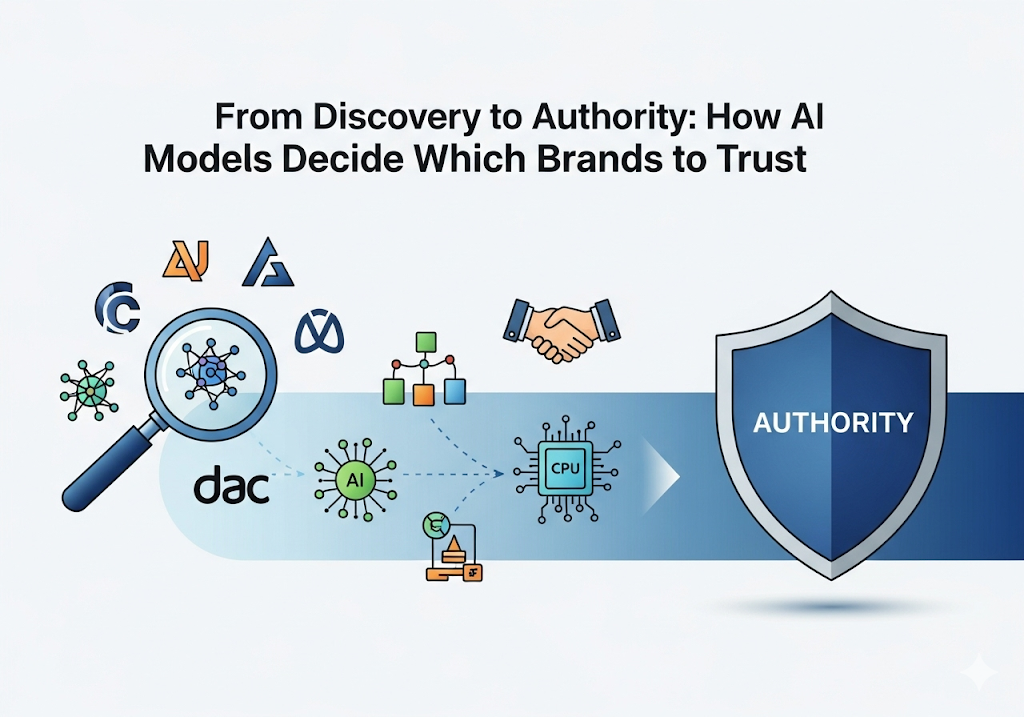AI search is rewriting the rules of brand visibility. If you’ve noticed ChatGPT, Perplexity, or Google AI Overviews consistently recommending the same brands in your industry, you’ve seen AI-driven authority in action.
But how do AI models decide which brands to trust — and which to ignore?
In this article, we’ll break down how discovery, reputation, and authority signals work in AI systems, plus give you an action plan to become a go-to brand in AI-generated answers.
Why Brand Trust Matters in AI Search
AI models aren’t just listing links — they’re making recommendations.
When someone asks:
“What are the best running shoes for flat feet?”
AI systems are under pressure to answer confidently and avoid misleading users. That means they’ll surface brands with:
- Consistent online mentions
- High review volume & sentiment
- Strong domain authority & backlinks
- Expert citations across blogs, forums, and media
Trust isn’t just about SEO anymore — it’s about your entire digital reputation.
Step 1: Discovery — Getting on the AI Radar
AI models first need to discover your brand before they can rank or recommend you.
Key discovery channels:
- Search engine indexing (Google, Bing)
- Public web data (news articles, blogs, wikis)
- UGC sources (Reddit, Quora, product forums)
- Structured data (schema markup, product feeds)
Tip: Make sure your brand, products, and key facts are crawlable and clearly stated in static HTML — not hidden behind JavaScript or logins.
Step 2: Reputation — Earning Positive Signals
Once discovered, AI models analyze how people talk about you.
Positive signals include:
- ⭐ High review ratings (Amazon, G2, Trustpilot)
- 📝 Mentions in “best of” lists and expert roundups
- 📈 Social proof (Reddit threads, Twitter discussions)
- 📰 Positive press coverage
Negative signals — like poor reviews or controversy — can hurt your standing in AI-generated answers.
Step 3: Authority — Becoming the Default Recommendation
Finally, authority comes from being consistently cited as a trusted source.
Brands that win here:
- Publish high-value content that others reference
- Dominate their niche (e.g., Garmin = GPS, Patagonia = sustainability)
- Build backlinks from top-tier publications
- Maintain brand consistency across all digital channels
When you hit this stage, AI models begin defaulting to your brand because it is statistically the safest answer.
How AI Models Measure Trust
AI models use a mix of:
- Entity recognition: Understanding your brand as a unique entity
- Knowledge graph signals: Linking you to topics, products, and industries
- Reputation scoring: Aggregating reviews, mentions, and sentiment
- Topical authority: Evaluating how often you appear in relevant contexts
This process is very similar to Google’s E-E-A-T framework (Experience, Expertise, Authoritativeness, Trustworthiness) — but with an even greater emphasis on reliability at scale.
Action Plan for Brands
- ✅ Make your brand discoverable: Ensure your key pages, about page, and product pages are fully crawlable and indexed.
- ✅ Encourage reviews: Target platforms that AI scrapes for data — not just Google reviews, but niche review sites in your industry.
- ✅ Invest in PR and thought leadership: Get cited in expert blogs, podcasts, and industry media.
- ✅ Leverage UGC: Encourage discussions in Reddit, Discord, Facebook groups, and forums.
- ✅ Add structured data: Use schema to explicitly tell AI who you are, what you sell, and why you’re relevant.
FAQs#
1. How do I know if AI models are picking up my brand?
Search your brand name in Perplexity or ask ChatGPT a category-level question. If you’re missing, you may not have enough discoverable signals.
2. Is link building still relevant for AI search?#
Yes — backlinks remain a major trust signal, but they work best when paired with reviews and UGC mentions.
3. Can negative press hurt AI visibility?
Yes. AI systems often factor in sentiment analysis. Address negative coverage quickly with positive PR and updated information.
4. How long does it take to build AI trust?#
Expect 6–18 months of consistent efforts in reviews, mentions, and authority content before you see significant results.
TL:DR
AI search doesn’t just list results — it chooses winners.
To earn a place in AI-generated answers, brands must go through the full journey:
Discovery → Reputation → Authority.
The takeaway? Be present, be trusted, be referenced. The brands that win tomorrow are the ones AI models already trust today.
✅ Next Step: Audit your brand mentions, structured data, and review profile — then start building authority systematically.
